- Home
- Michael Grant
Front Lines Page 21
Front Lines Read online
Page 21
My own leg hurts, my breast hurts, but I’m not that poor woman screaming in the night, am I? Will you understand if I tell you that there are times when it is better to feel the pain yourself than to see it and hear it in another?
Helplessness is a big part of war, helplessness and confusion and boredom, too, so that at times you tell the woman or man beside you that you’d rather be getting shot at. But that’s always a lie, something you say to . . .
I’m getting ahead of myself. I am not here to ruminate and philosophize, or to attempt eloquence, I am here to tell the story, our story. Much of the time my fingers fairly dance over the keys and the sheets of paper go flying in and out. But right now as I write this, each letter is a struggle. For now our story leaves behind the sweet before and enters the darker after.
Where is this war, you wonder? Enough of the familiar; show me the blood and guts. When do we get to the killing and the dying?
Well, it is very near now, Gentle Reader, for we are going to North Africa, to the deserts where the Brits have the famed German Afrika Korps on the run after many battles. The Americans have landed against some resistance from the Vichy French, most of which crumbled soon enough.
It was supposed to be a pincer movement; Brits to the east in Egypt and Libya, Americans to the west in Morocco and Algeria, with the Germans, a few Italians, and a sprinkling of unrepentant French collaborators—running out of fuel, tanks, and ammo—trapped helplessly between the two.
We had yet to learn war, and we had yet to learn that the Kraut was never helpless.
One more boat ride and we will arrive at the front lines in Tunisia. And there, Gentle Reader, you’ll get your blood and guts.
LETTERS SENT
Dear Pastor M’Dale,
I hope you won’t mind me writing to you. I am writing to my parents and brothers as well, but I can’t worry them. I suppose I shouldn’t be worrying you either, but I need to do this, I need to write to someone. I talk to the other folks in my unit, but none of them has become really close. The men don’t talk to us women, and the women mostly want to talk about what dress they’ll get for the big victory party we all keep saying we’ll throw someday. Or else they talk about boys, and that’s not on the top of my mind. I guess you’ll be relieved to hear that.
After an uneventful sea voyage, I’m in XXXXXX. I think I can say that without getting censored. They put me on a ward for badly injured English soldiers as practical training. The Tommies aren’t as concerned about black folk tending their white wounded since a lot of their nurses are already from colonies where folks are mostly brown or black. It’s not like the white boys treat us as equals, but they seem happy to have any soft hand regardless of color to apply a salve or inject morphine.
I saw some bad things, sir. I don’t really know how to explain without making you see what I don’t suppose you want to see. But I think if I don’t tell someone I’ll crack up.
There was this one white boy. I can’t tell you his name so I’ll make one up: Errol. I’ve always liked that name.
Anyway, Errol had got hit by a passing 88 shell. It didn’t explode because it was fused for armor not flesh, but it took off a chunk of his face, including his nose and part of a cheek. His buddies had found the missing flesh and bandaged it back on and sent him off to their field hospital and they had tried to sew it back on. And when he got evacuated here to XXXXXX the doctors thought maybe . . . But it didn’t take, so the sewed-on part grew septic and morbid.
Pastor, they had to cut that boy’s face back off. They were trying to keep the infection from spreading, but now it’s all down his neck and his hair is falling out and when I saw him again he was raving. The infection was in his brain. He kept screaming and trying to tear the bandage off. Finally he died. Maybe it was one of the doctors deliberately XXXXXXXXXXXXXXXXXXXXX, and maybe that’s wrong according to the Bible, but now Errol can be in heaven where he will not have to scream.
I know you said helping keep these soldiers alive means they can go back to killing, but lots of these boys will be lucky to have any kind of life, let alone go back to war.
I guess I wanted to tell you that. And I wanted to ask you how God lets this happen. I was angry with God over that. I blasphemed. I repented as best I could, but in my heart I’m still angry.
I can’t tell my folks that or they’ll worry, so I’m telling you.
Keep praying for me, Pastor. Don’t forget me.
Frangie
Dear Father,
I am well, though somewhat damp and oppressed by gray weather in a place I shall not name but which you may reasonably deduce. You’d think given my name I’d be better at enduring rain. I don’t believe we shall be here for long, though I have no idea where the army may send me next.
I have to tell you some things that may disturb you. Let me start by saying I know about the numbers running—they found out during an investigation of my background. I was surprised and disappointed, I guess, but I’m not upset now. You’ve always been a good father, and you did what you had to do to keep us all fed and together during the Depression and since then too. The commandments say we should honor our parents, and I do honor you, and I don’t think I have anything to forgive.
But I’m going to tell you something now that you need to know in case something happens to Aryeh. You have a grandchild on the way. (No, not mine!) Aryeh fell in love and one thing led to another.
And, Father, the girl, his wife, is not a Jew. Her name is Jane Meehan. I’ve arranged to give her some of my pay and so has Aryeh, of course, but who knows what may happen in a war.
Next letter I promise will have fewer surprises.
Love,
Rainy
Dear Strand,
It was wonderful being able to spend some time with you on the XXXXX. I so wish it had been more. I suppose there are good things about a fast ship, but the time did fly by.
We spent XXXXX in XXXXX doing more tedious training, and I had hoped to see you there and be able to spend time with you in Jolly Old XXXXXX. But I’m afraid I’m off yet again to parts unknown and the rumor is that XXXXXXXXXXXXXXXXXXXXX XXXXXXXXXXX XXXXXXXX. So this may be XXXXXXXXXXX.
I don’t mean to seem contrary or argumentative, but I suppose it got under my skin a little when you said I was “playing” soldier. Maybe I was a little, in the beginning, but I think now it won’t be any kind of play. I’m not sure I’m ready for what lies ahead, but I mean to do my best. I want you to understand that, and I hope you’ll be proud of me. Even when I’m a grizzled old veteran. Funny, huh?
I keep your picture with me and look at it often. I will think of you up there in the sky, somewhere, being very brave and dashing. I will think of you every day.
Maybe this is silly and too sentimental, but I hope the day will come when we can find ourselves back at the Jubilee, sharing popcorn and watching a movie. Would you like that? I would.
Please take care of yourself, Strand. Please.
Your girl,
Rio
21
RIO RICHLIN, FRANGIE MARR, RAINY SCHULTERMAN—ABOARD USS TIBURON, OFF THE COAST OF PORTUGAL
“Jesus save us!” Kerwin cries, perhaps being funny, but perhaps scared as hell too.
The Tiburon—a much, much smaller ship than the Queen Mary, and much, much more likely to be tossed around like a cork—reaches the top of a wave and then shoots down the far side like a boulder rolling down the side of a mountain. For a few seconds Rio feels as if gravity has been canceled. But gravity comes right back with a vengeance as the ship bottoms out, nearly collapsing Rio’s knees.
“I never knew being in the army meant so much time on boats,” Jenou says. “And if we have to be on boats, why can’t it be the Queen instead of this old tub? I liked the Queen.”
“Yes,” Rio says wryly, “you had a very good time on the Queen.”
“Oh, I wouldn’t call one young ensign a very good time. More like a . . . diversion,” Jenou says, and a
ttempts to toss her hair coyly, an effect ruined by the fact that her hair—and the rest of her as well—is quite wet.
Rio, Jenou, Cat, Kerwin, Luther, Tilo, Stick, and Jack have been formed into a squad with the sullen and unfriendly Jillion Magraff, a gloomy corporal named Hark Millican, a very Japanese-looking and instantly distrusted Hansu Pang, and Buck Sergeant Cole, who is to be their squad leader.
Most of the squad is in bunks trying desperately not to vomit. But Rio, Jenou, Cat, Stick, Tilo, Kerwin, and Jack are either immune to seasickness or else have already emptied every possible fluid from their bodies. The seven of them have found a tiny, cramped space beneath an overhanging gangway on the port side. They are shielded from the direct blasts of the weather and catch only spray rather than the massive, deck-clearing gray-green waves that roll over the bow and the starboard side.
“This is bad,” Rio shouts above the wind. “Not as bad as down below.”
“At least there’s some oxygen up here,” Cat agrees. “Somewhat damp, though.”
Their outer layers are soaked despite the ponchos they wear. Tilo has for once abandoned vanity to tie a red plaid scarf—a gift from an aunt—around his head. The scarf is soaked, and Rio can see each breath he takes as it draws wet wool into his mouth.
“You know your problem,” Jack says, shouting to be heard over another moan from Cassel. “You’re not a seafaring folk, you Yanks. You don’t know how to cope with these mildly blustery conditions.”
Stick, normally the most stoic of the group, says, “I don’t want to punch you in the nose, Stafford, but I will.”
“Ah, but being of proper English seafaring stock, I have managed to obtain a cure for all our ills,” Jack says, and with that draws a bottle of whiskey from beneath his poncho.
Rio has sipped the occasional beer at home in Gedwell Falls, has drunk entire beers during the bleak, wet, dull two weeks of training in England, but has never before tasted whiskey. Jack hands the bottle to her first, and though she has her doubts, she doesn’t want to be a stick-in-the-mud.
So she tilts the bottle back and takes a deep swig of what feels like liquid fire.
“Good, eh?” Jack asks.
To which Rio replies, “Cchh . . . Ah . . . Mmpf . . .” and gasps out several painful breaths.
Jack grins happily, sticks his fists on his hips, widens his stance, and begins to sing at the top of his voice.
“When Britain f-i-i-irst, at heaven’s command,
Arose from out the a-a-a-azure main,
Arose, arose from out the azure main;
This was the charter, the charter of the Land
And Guardian A-a-a-angels sang this strain . . .”
Tilo says something that sounds like an exasperated threat, but it isn’t intelligible through his scarf. Rio, however, is charmed to discover that Jack has quite a good singing voice.
“Rule Britannia, Britannia rule the waves!
Britons never, never, never shall be slaves.
Rule Britannia, Britannia rule the waves!
Britons never, never, never shall be slaves!”
“I’m going to kill him, just as soon as we finish his bottle,” Kerwin says, taking a drink.
In short order they are seven quite drunk soldiers, stumbling helplessly into one another with each big swell. And now they are an impromptu chorus belting out the chorus, “Rule, Britannia, Britannia rule the waves,” despite some querulous looks from passing sailors who, being Americans, are not pleased to be celebrating the Royal Navy.
Yes, Rio thinks, Jack has a very nice singing voice. And she likes his accent too.
Rio has no experience of being drunk. Jenou is a bit more knowledgeable and is amused by the sight of her friend growing more garrulous and more friendly. And less steady on her feet.
And Jenou is also more observant when it comes to men. She has noticed several lingering looks from a seriously inebriated Jack—looks aimed not at Jenou but at Rio.
Well, Jenou thinks, there’s no accounting for taste. She tilts her head and gives Tilo a speculative glance, but Tilo has just collapsed in a heap, completely unconscious. Stick hauls him away by the only means he can manage on the pitching deck: he’s got one of Tilo’s ankles in each of his hands and is dragging him as if he’s pulling a wagon.
Jenou says, “Maybe we better get below too,” and takes Rio by the arm.
Rio laughs as if that’s a joke and peers around owlishly, surprised to discover that her little group has already attrited, reduced now to just herself, Jack, Jenou, and Kerwin.
“Come on,” Rio says, “party’s just getting started!”
Jenou rolls her eyes, torn between a never-very-strong sense of responsibility and amusement. Then the matter is settled when Kerwin seems to freeze solid in midsentence, eyes fixed, jaw slack.
“Wha’s Cassel starin’ at?” Rio asks.
“Absolutely nothing,” Jenou says. She sighs. “The care and feeding of drunks. All this way to deal with drunks. I could have stayed home and helped pour my father into his bed. Come on, Cassel, let’s get you to where you won’t wash over the side.”
Rio watches them stagger away and is overwhelmed by a wave of sadness for Jenou. Both Jenou’s parents are heavy drinkers. Rio’s known that since she was eight and witnessed the two of them throwing dinner plates across the dining room. It’s a burden for Jenou.
Jenou leans close to Rio, puts her mouth right up close to her ear, and says, “You’re drunk, honey. Don’t do anything you shouldn’t do.”
“Wha’ should I . . . should not, shouldn’t I do?”
“Okay, I’m coming right back for you,” Jenou says, pointing a warning finger at Rio. “Don’t get washed overboard before I get back.”
“M’be righ’ there,” Rio calls after her friend.
“Uh-huh,” Jenou says, and guides the comatose Kerwin away like she’s leading a blind man.
“Where are they . . . huh . . . ,” Jack says, and sways into Rio, causing her to giggle, which causes him to giggle, and the two of them roar with laughter when a wave sneaks up the port side to slap at them and barely misses.
“Almost got us,” Rio says.
“Nazi wave. Thass wha’ that was,” Jack says.
“I thought Britannia ruled them. The waves.”
“Not tha’ one. Tha’ was a bloody treasonous wave.”
It is the last assault of a sea that is calming by degrees. Rio and Jack lean back against the steel bulkhead and stare blearily out at the convoy around them. A Royal Navy destroyer is a mile off, eternally patrolling for submarines. A second troopship is nearer, in line just astern. The sky is ragged, scudding clouds below a silvery moon, sky and moon both untroubled by the storm below.
“I’ve got . . .” Jack holds the bottle up to see that it has less than an inch of auburn liquid left in it. “That much lef.”
“No more,” Rio says.
Jack upends the bottle, swallows all that remains, and then belatedly says, “Sure you don’t want some?”
He is suddenly standing very close to Rio, or perhaps she’s standing very close to him, close enough that they no longer need to shout.
“You sing . . . good,” Rio says.
“You shoot good,” Jack says. “You shoot, I’ll sing.”
At which point he launches into a largely incomprehensible version of a song Rio has never heard.
“Come, come, come and make eyes at me, down at the old Bull and Bush, la-la-la.”
“Make eyes,” Rio says, and follows it with a snorting laugh. “I don’t even know wha’ tha’ means. Make eyes.”
“Hah!”
“Jenou, she . . . I don’t . . .” Something has gone wrong with her brain and her body, the sober voice buried deep inside her inebriated brain notices with alarm. Her body is way too cold and wet to feel this warm.
Jack turns to her and looks directly into her eyes.
“What. Are. You. Doing? Jack Stafford?” Rio enunciates as carefully as she can.
<
br /> “Making eyes at you,” Jack says.
Rio is going to laugh but doesn’t. She’s about to give him a playful shove but doesn’t do that either. Instead she feels herself falling toward him, as if some kind of gravity wave is beaming from his suddenly serious eyes.
“I can do that,” Rio says. She steadies her head, which has a tendency to want to loll back and forth with each movement of the ship. And she looks into his eyes.
“Wow,” Rio says.
“Mmm?”
“It’s like . . .”
“Like?”
“Um . . .”
She closes her eyes when he kisses her.
The first kiss is tentative and a bit sloppy. Jack pulls away. He seems to be trying to focus his eyes, then gives up and in the end closes them, and moves forward blindly for a second kiss.
It would be easy for Rio to push him away. But she doesn’t. Nor does she close her eyes this time, but watches him, watches him with minute attention, and when it begins to look very much as if he will miss his target, she takes his face with her two cold hands and holds him still. Holds him still, and he opens his eyes, heavy lidded, somehow innocent and lustful at once, and for what feels like a very long time the two of them just look, inches separating them.
The distance between them lessens, and Rio feels the warmth of his breath on her nose and cheeks. His lips are parted, waiting, and she draws him closer, fraction of an inch by fraction of an inch. She tilts his head to the right, and her own to the left, because that is the opposite of how Strand kissed her, and she is aware of that memory, and aware that what she is doing is very wrong, but this is not a moment for fine moral considerations. Of far greater importance right now is the feeling in the pit of her stomach, and the trembling of her hands on his face, and the realization that they have both stopped breathing.
He does not kiss her, she kisses him, lips parted so she can taste him.
Which is when Jenou reappears to say, “Uh-oh.”
Your father got a job!
Frangie clenches her teeth as her bunk passes through all the angles between 45 and 135 degrees. On the downswing she extends her feet to stop sliding in that direction, and on the upswing she sticks a hand over her head to brace against sliding in that direction.

 Fear
Fear Plague
Plague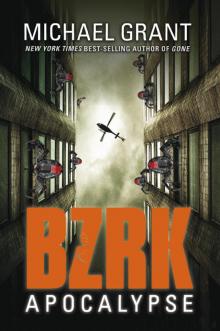 BZRK: Apocalypse
BZRK: Apocalypse Bzrk
Bzrk Love Sucks and Then You Die
Love Sucks and Then You Die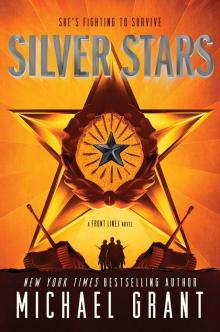 Silver Stars
Silver Stars The Key
The Key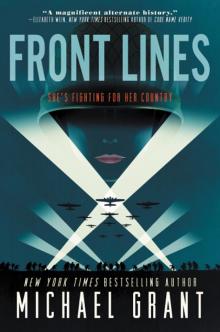 Front Lines
Front Lines BZRK Origins
BZRK Origins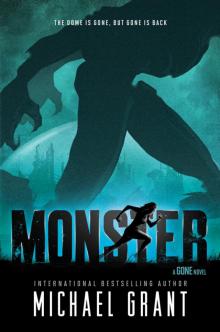 Monster
Monster Gone
Gone The Snake
The Snake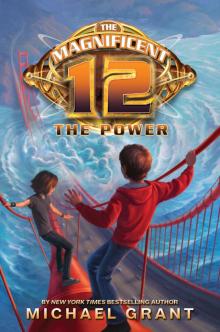 The Power
The Power Hunger
Hunger Lies
Lies A Sudden Death in Cyprus
A Sudden Death in Cyprus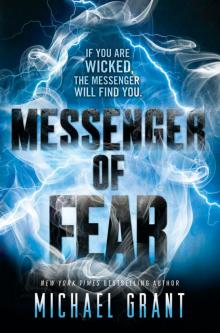 Messenger of Fear
Messenger of Fear Eve & Adam
Eve & Adam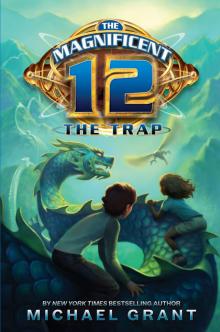 The Trap
The Trap Light
Light An Artful Assassin in Amsterdam
An Artful Assassin in Amsterdam The Call
The Call Hero
Hero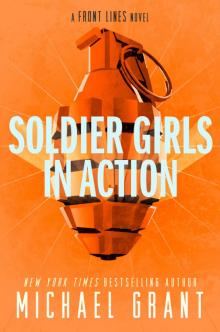 Soldier Girls in Action
Soldier Girls in Action Purple Hearts
Purple Hearts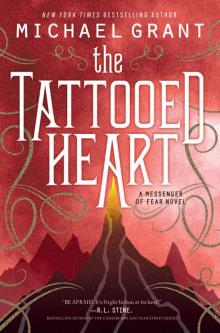 The Tattooed Heart
The Tattooed Heart The Fall of the Roman Empire
The Fall of the Roman Empire BZRK Reloaded
BZRK Reloaded Messenger of Fear Novella #1
Messenger of Fear Novella #1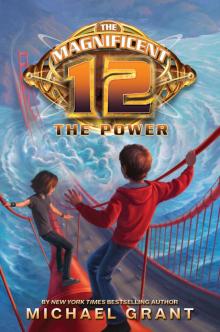 The Magnificent 12
The Magnificent 12 Fear: A Gone Novel
Fear: A Gone Novel Villain
Villain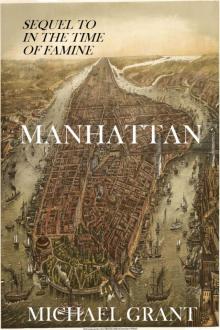 Manhattan
Manhattan Eve and Adam
Eve and Adam Plague: A Gone Novel
Plague: A Gone Novel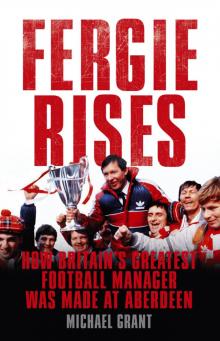 Fergie Rises
Fergie Rises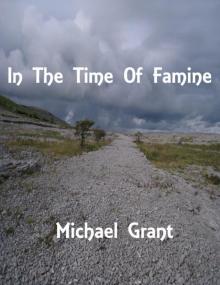 In the Time of Famine
In the Time of Famine Hunger_A Gone Novel
Hunger_A Gone Novel Lies g-3
Lies g-3